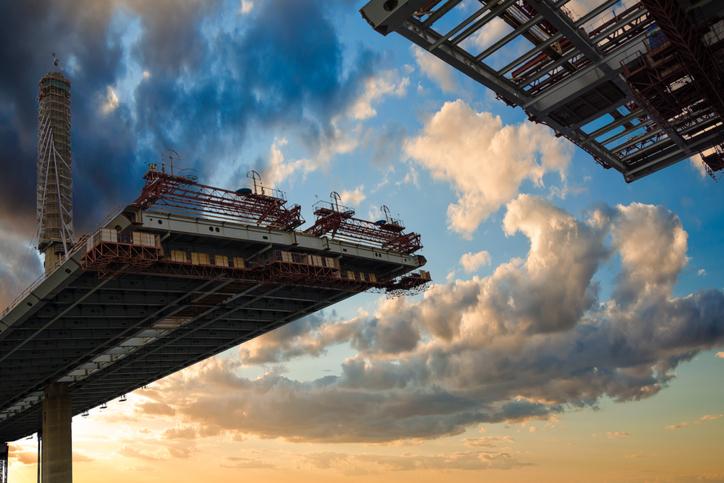Contributing Writer
- FMA
- The Fabricator
- FABTECH
- Canadian Metalworking
Categories
- Additive Manufacturing
- Aluminum Welding
- Arc Welding
- Assembly and Joining
- Automation and Robotics
- Bending and Forming
- Consumables
- Cutting and Weld Prep
- Electric Vehicles
- En Español
- Finishing
- Hydroforming
- Laser Cutting
- Laser Welding
- Machining
- Manufacturing Software
- Materials Handling
- Metals/Materials
- Oxyfuel Cutting
- Plasma Cutting
- Power Tools
- Punching and Other Holemaking
- Roll Forming
- Safety
- Sawing
- Shearing
- Shop Management
- Testing and Measuring
- Tube and Pipe Fabrication
- Tube and Pipe Production
- Waterjet Cutting
Industry Directory
Webcasts
Podcasts
FAB 40
Advertise
Subscribe
Account Login
Search
Confusion reigns over federal implementation of Buy American
Some agency rules contradict the spirit of the Build America, Buy America law
- By Stephen Barlas
- UPDATED March 8, 2024
- March 6, 2024

The Infrastructure Investment and Jobs Act promised a shot in the arm for U.S. roads, bridges, and other projects, but the Buy America aspects of the law are confusing structural steel fabricators and contractors. Asergieiev/iStock/Getty Images Plus
There continues to be dissatisfaction among infrastructure project managers with the impact of the Build America, Buy America (BABA) law on the use of domestically sourced steel and iron products.
BABA, included in the Infrastructure Investment and Jobs Act (IIJA), expanded domestic content requirements for use of U.S.-made steel and iron. The White House Office of Management and Budget set regulations in September 2023. At a Feb. 18 hearing in front of the House Subcommittee on Highways and Transit, complaints started to emerge from both the steel companies selling the raw material for these infrastructure projects and the contractor buying the steel.
Some members of Congress have introduced legislation to fix various problems or shortcomings in BABA. One such issue is a policy from the Federal Transit Administration (FTA) that allows governmental bodies to continue to buy rail cars and buses from China, in perpetuity, even if contracts were signed by December 2019 and even though the rail cars are made with Chinese steel. In this particular case, the House Transportation Committee recently passed the Rolling Stock Protection Act with a bipartisan majority to cancel the FTA exemption.
“The contradictory guidance put forward by the Biden Administration on Buy America waivers continues to cause project delays and regrettably leads to cost increases for the businesses that build our roads and bridges as well as operate the equipment in our transportation network,” said Rep. Rick Crawford, R-Ark., chairman of the House Highways and Transit Subcommittee.
That 2022 BABA law particularly affects contracts funded by various Department of Transportation agencies that fund the vast majority of infrastructure projects covered by Made in America buying restrictions.
“It’s time to fully implement the Build America, Buy America Act and end the overly broad waivers that have limited the policy's effectiveness,” stated Scott Paul, president, Alliance for American Manufacturing.
“With the 2024 transportation construction season on the horizon, there remains significant concern regarding the readiness of industry for the transition to recent and anticipated increases in BABA requirements,” added Carlos M. Braceras P.E., executive director, Utah Department of Transportation. “Materials including aluminum, which is used in numerous products including light poles, mast arms, and sign panels … have been in short supply around the country over the past two years, contributing to ongoing delivery delays for these critical items.” Aluminum, copper, and lead are some of the other raw materials, in addition to steel, that are considered construction materials covered by BABA.
One major, outstanding issue is a Federal Highway Administration (FHWA) 1993 policy that applies its own Made in America requirements to manufactured products containing steel and iron, and even aluminum. In some instances, this policy has provided waivers for companies unable to comply with the Made in America requirements. BABA did not override that particular FHWA policy.
Nor did it override an FTA policy that does the opposite. In this instance, manufactured products containing steel and iron are not subject to domestic procurement requirements.
The IIJA requires the FHWA to determine whether its 1993 policy is outdated. The agency has not made a decision yet, and some parties involved in infrastructure development are concerned as to its outcome. For U.S. producers of manufactured products, the elimination of a particular waiver (which would occur with the reversal of the 1993 policy) would mean they could now source foreign steel and iron if it were to be included in higher-value manufactured products destined for infrastructure uses.
“As FHWA reviews its nationwide waiver for manufactured products, it should leave untouched its longstanding policy requiring that all steel be produced in the United States, including the steel contained in manufactured products,” said Dan Needham, executive vice president of commercial, Nucor Corp.
subscribe now

The Fabricator is North America's leading magazine for the metal forming and fabricating industry. The magazine delivers the news, technical articles, and case histories that enable fabricators to do their jobs more efficiently. The Fabricator has served the industry since 1970.
start your free subscriptionAbout the Author

Stephen Barlas
- Stay connected from anywhere

Easily access valuable industry resources now with full access to the digital edition of The Fabricator.

Easily access valuable industry resources now with full access to the digital edition of The Welder.

Easily access valuable industry resources now with full access to the digital edition of The Tube and Pipe Journal.
- Podcasting
- Podcast:
- The Fabricator Podcast
- Published:
- 04/16/2024
- Running Time:
- 63:29
In this episode of The Fabricator Podcast, Caleb Chamberlain, co-founder and CEO of OSH Cut, discusses his company’s...
- Trending Articles
Tips for creating sheet metal tubes with perforations

Are two heads better than one in fiber laser cutting?

Supporting the metal fabricating industry through FMA

JM Steel triples capacity for solar energy projects at Pennsylvania facility

Omco Solar opens second Alabama manufacturing facility

- Industry Events
16th Annual Safety Conference
- April 30 - May 1, 2024
- Elgin,
Pipe and Tube Conference
- May 21 - 22, 2024
- Omaha, NE
World-Class Roll Forming Workshop
- June 5 - 6, 2024
- Louisville, KY
Advanced Laser Application Workshop
- June 25 - 27, 2024
- Novi, MI


























